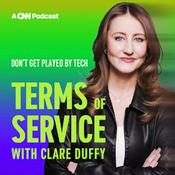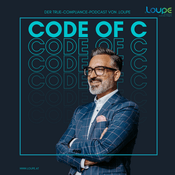67 Episoden
- Many in Silicon Valley say smarter-than-humans “Artificial General Intelligence” is just around the corner. But is it really possible to create superhuman AI? And should we want to? AI researcher and Cohere co-founder Nick Frosst explains why he thinks the industry shouldn’t be focused on AGI. And he shares his take on perhaps the biggest question surrounding this technology: Could it pose an existential threat to humanity?
Terms of Service is a CNN Podcasts and Goat Rodeo production.
This episode was produced by Cara Shillenn.
At Goat Rodeo, the lead producer is Rebecca Seidel
Executive producers are Megan Nadolski and Ian Enright
At CNN, Matt Martinez is our Senior Producer and Dan Dzula is our Technical Director.
Production support from Sofía Sanchez and Dan Bloom.
Special thanks to Ludlow House and On Air Presents.
Learn more about your ad choices. Visit podcastchoices.com/adchoices - Dating apps have been part of modern romance for years, but data suggests users are experiencing a bit of swiping fatigue. Hinge, however, has managed to avoid the dating app downturn. Hinge CEO Jackie Jantos chats with Clare about how the app supports the evolving needs of Gen Z daters, whether AI can help us find love, and her advice for people seeking connections this Valentine’s Day season.
Terms of Service is a CNN Podcasts and Goat Rodeo production. This episode was produced by Jay Venables. At Goat Rodeo, the lead producer is Rebecca Seidel, and the executive producers are Megan Nadolski and Ian Enright. At CNN, Matt Martinez is our Senior Producer and Dan Dzula is our Technical Director. Production support from Sofía Sanchez.
Learn more about your ad choices. Visit podcastchoices.com/adchoices - Online sports gambling has become a massive business. That means that for individual bettors, there can be serious money on the line, too. So how exactly do sports betting apps work, and what should users keep in mind when placing bets? Sports betting apps say they have taken steps to protect customers, but Harry Levant, Director of Gambling Policy at the Public Health Advocacy Institute, thinks people should take caution.
This episode includes references to suicide. Help is available if you or someone you know is struggling with suicidal thoughts or mental health matters. In the US: Call or text 988, the Suicide & Crisis Lifeline. Globally: The International Association for Suicide Prevention and Befrienders Worldwide have contact information for crisis centers.
Terms of Service is a CNN Podcasts and Goat Rodeo production. This episode was produced by Hazel Hoffman. At Goat Rodeo, the lead producer is Rebecca Seidel, and the executive producers are Megan Nadolski and Ian Enright. At CNN, Matt Martinez is our Senior Producer and Dan Dzula is our Technical Director. Production support from Sofía Sanchez. Steve Lickteig is the Executive Producer of CNN Audio. Production support from Anna Sturla and Kelly Burns.
Learn more about your ad choices. Visit podcastchoices.com/adchoices - Silicon Valley leaders have said that the jobs poised to be most affected by AI are entry-level positions. What does the next generation of workers think about that? On this episode, three high school students share how they’re planning their futures with AI in mind. Plus, a tech executive shares advice for teens as they approach this changing job market.
We’re taking listener questions for upcoming episodes! If you have tech questions or concerns you’d like answered, email us or send us a voice note at [email protected].
Terms of Service is a CNN Podcasts and Goat Rodeo production. This episode was produced by Jay Venables. At Goat Rodeo, the lead producer is Rebecca Seidel, and the executive producers are Megan Nadolski and Ian Enright. At CNN, Matt Martinez is our Senior Producer and Dan Dzula is our Technical Director. Production support from Sofía Sanchez. Steve Lickteig is the Executive Producer of CNN Audio. Production support from Anna Sturla and Kelly Burns.
Learn more about your ad choices. Visit podcastchoices.com/adchoices - Your email sits at the center of your online life — it holds personal communications, purchase history and the ability to reset other passwords. Email security isn’t just for people who handle sensitive information at work. How can everyone keep their emails and other online data more secure? Patricia Egger, Head of Security at Proton, shares some practical tips for safeguarding your communications – and talks about why it matters.
One method of protecting your online data mentioned in this episode is using a password manager. Terms of Service put out an episode about this in 2024, which you can find here.
Terms of Service is a CNN Podcasts and Goat Rodeo production. This episode was produced by Jay Venables. At Goat Rodeo, the lead producer is Rebecca Seidel, and the executive producers are Megan Nadolski and Ian Enright. At CNN, Matt Martinez is our Senior Producer and Dan Dzula is our Technical Director. Production support from Sofía Sanchez. Steve Lickteig is the Executive Producer of CNN Audio.
Learn more about your ad choices. Visit podcastchoices.com/adchoices
Weitere Wirtschaft Podcasts
Trending Wirtschaft Podcasts
Über Terms of Service with Clare Duffy
New technologies like artificial intelligence, facial recognition and social media algorithms are changing our world so fast that it can be hard to keep up. This cutting-edge tech often inspires overblown hype — and fear. That’s where we come in.
Each week, CNN Tech Writer Clare Duffy will break down how these technologies work and what they’ll mean for your life in terms that don’t require an engineering degree to understand. And we’ll empower you to start experimenting with these tools, without getting played by them.
Podcast-WebsiteHöre Terms of Service with Clare Duffy, The Diary Of A CEO with Steven Bartlett und viele andere Podcasts aus aller Welt mit der radio.at-App
Hol dir die kostenlose radio.at App
- Sender und Podcasts favorisieren
- Streamen via Wifi oder Bluetooth
- Unterstützt Carplay & Android Auto
- viele weitere App Funktionen
Hol dir die kostenlose radio.at App
- Sender und Podcasts favorisieren
- Streamen via Wifi oder Bluetooth
- Unterstützt Carplay & Android Auto
- viele weitere App Funktionen

Terms of Service with Clare Duffy
Code scannen,
App laden,
loshören.
App laden,
loshören.






































